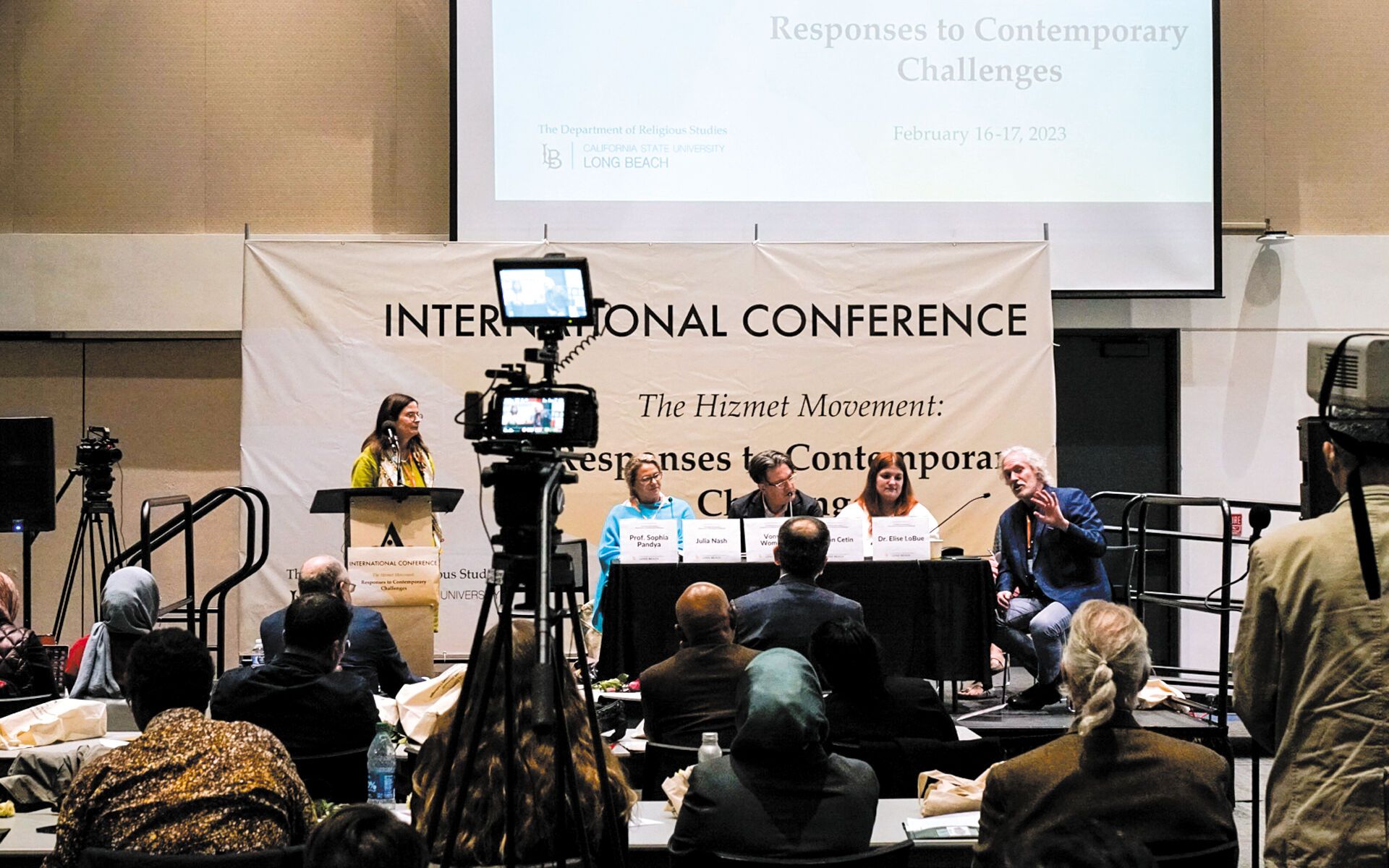Rising from the Ashes

In This Article
-
California State University hosted a two-day conference on February 16-17, 2023, to explore Hizmet’s activities and the challenges they face as immigrants in different countries.
-
In Turkey, many women have been facing inhuman treatments in prisons, which included many heartbreaking stories of new mothers giving birth while handcuffed to a hospital bed.
-
Hizmet Movement is more engaged in “bridging” work with the “other” compared to more politically motivated groups who prefer in-group “bonding.”
2023 marks a full decade since the beginning of the unprecedented persecution of the Hizmet movement started in Turkey, the movement’s home country. Its institutions were confiscated, its volunteers purged, and tens of thousands of associates were arrested—many of whom are still under arrest. Despite this persecution at home, Hizmet continues to promote education and dialogue elsewhere. This resilience did not go unnoticed: California State University hosted a two-day conference on February 16-17, 2023, to explore Hizmet’s activities and the challenges they face as immigrants in different countries. Over 270 participants from 22 countries attended the conference to listen to presentations dissecting Hizmet’s interactions with modern society and the movement’s contribution to its improvement.
The conference took place only ten days after massive earthquakes left at least forty thousand dead across southeast Turkey, leaving many cities almost entirely uninhabitable. In her welcome speech as the host of the conference, Professor Sophia Pandya, the department chair at California State University at Long Beach, in the Department of Religious Studies, called for a moment of silence to honor those who lost their lives. She further pointed to the trauma this disaster has added to the Hizmet community, some of whom have lost family and perhaps suffer from “survivor’s guilt” while being unable to assist former countrymen and women. Suffering is accompanied with anger because of the rampant corruption and greed that led to needless deaths under buildings which were not built to code. University psychologist Corrie O’Toole participated in the conference to present a tool called EFT tapping to help with stress, trauma, and anxiety. Quoting Rumi, Dr. Pandya noted that “through love, all pain will turn to medicine.” She also suggested that “Hizmet” should be used to identify the movement—instead of “Gülen Movement,” which some academics prefer for easier association. But “Hizmet” is more accurate, she emphasized, because its participants prefer to use it and communities and individuals should be allowed to self-identify.
Dr. Elise LoBue from the University of Illinois Springfield presented some of the findings from her research on Turkish refugees in Canada. Many Hizmet volunteers who had to leave Turkey have been seeking refuge in Western countries, including Canada. Among the reasons they chose Canada was their perception of the country as more immigrant-friendly, where many Muslim women could participate in the workforce with fewer concerns—at least relatively—about practicing their faith and dress. Trump’s election in the United States was also another major factor pushing many Muslim refugees further north. Despite the recent rise of Islamophobia in the country, Canada is still a good option for many immigrants. Dr. LoBue also emphasized the fact that Hizmet is more prone to integration than many other immigrant groups because of the “Hizmet philosophy.”
Dr. Ori Z Soltes, professor of theology and philosophy at Georgetown University and the author of a recently published book titled Between Thought and Action: An Intellectual Biography of Fethullah Gülen, drew similarities between the persecution of Hizmet under the current Turkish regime and the one Jews and communists endured under Hitler. Thankfully, the result is not as tragic as during the Holocaust, but it is noteworthy to see how authoritarian regimes use similar tactics to cling to power by stigmatizing and scapegoating certain groups.
Vonya Womack spoke about her research regarding the unjustly incarcerated women affiliated with Hizmet. Many women were arrested for working for a Hizmet school or having a bank account with a certain lawfully operating bank. Womack portrayed inhuman treatments in prisons, which included many heartbreaking stories of new mothers giving birth while handcuffed to a hospital bed.
Ayhan Cetin from South Africa presented a report of his interviews with Hizmet volunteers who had moved to his country, focusing especially on how their approach to other human rights violations in Turkey and around the world has changed in recent years.
In the second panel chaired by Professor Jon Pahl, the author of Fethullah Gülen: A Life of Hizmet, Dr. Fevzi Sarac from Louisiana State University pointed to how the Hizmet Movement is more engaged in “bridging” work with the “other” compared to more politically motivated groups who prefer in-group “bonding.” Dr. Zeki Saritoprak from John Carroll University (Cleveland) explained that although he does not agree with the dichotomy of “political Islam” vs. “civil Islam,” he lacks words to show the differences between groups like Hizmet, which is engaged in civil activities, and apparently religious figures, as in Turkey, who abuse Islam for their political interests. Dr. Reginald Nalugala from Tangaza University College (Kenya) pointed to the importance of the works done by Hizmet to counter radical fundamentalism around the world. Dr. John Turres from Lagrange University in Georgia presented his research on the connection of authoritarian regimes with sports, focusing on examples from the World Cup and including stories of top Turkish athletes like Enes Kanter and Hakan Sukur, who are being threatened by the government.
Rabbi Yakov Nagen, the Director of the Blickle Institute for Interfaith Dialogue, explained in the third panel his initiatives for better understanding between Muslims and Jews, and how he conducted some of that work with the Hizmet community. Answering a question from the floor about how similar he found the resilience of Hizmet to that of Jews historically, Rabbi Nagen praised how the Hizmet community is building bridges at a time when they do not have a land of their own. Professor Pim Valkenberg and Kate Middleton from the Catholic University of America talked about the spiritual stations of hawf and raja (fear and hope) emphasized by Fethullah Gülen in his works and how these concepts interplay with the resilience of the Hizmet community through the difficult times they are going through.
Sister Martha Ann Kirk explained in her presentation that her religious community used to run many schools in the US and Mexico, but about a hundred years ago, they were confiscated in a similar way to what happened to the Hizmet schools in Turkey. She said that after so many years, her community is still surviving and continuing their services. Dr. Aydin Inal, from South Africa, contextualized Hizmet activities in the context of the Ubuntu philosophy, in which humankind is perceived in a harmonious relationship with the world. Dr. Rajendran T. Govender, former Director in the Kwa-Zulu Natal Department of Arts and Culture in South Africa, explained Hizmet’s dialogue activities in that country. Dr. Macharia Munene, lecturer at the United States International University Africa in Nairobi, spoke about how Hizmet schools were first established in Kenya by very young and dedicated young educators in the ‘90s, when Kenya experienced a number of terrorist attacks. Dr. Munene explained how these schools still hold the top academic position in the country despite many pressures to close them from the Turkish government.
One of the conference’s key moments was the evening reception, when Dr. Scott Alexander from Catholic Theological Union in Chicago delivered the keynote speech. Drawing on from The Three Box Solution: A Strategy for Leading Innovation by Vijay Govindarajan, Dr. Alexander explained how Hizmet has been using this management strategy, knowingly or unknowingly, to manage their current affairs while building their future. He emphasized the importance of youth empowerment and gave examples of how Jesus, Joseph, and Muhammad (peace be upon them) were recognized with their wisdom at a young age according to Islamic tradition. Mike Honda, a former representative of California in the Congress, said in his brief address at the reception that “Hizmet values are American values.”
The second day of the conference started with a panel chaired by Professor Paul Weller from the UK, who has authored multiple works on Hizmet, the last two released simultaneously in 2022. Professor Anwar Alam, the author of For the Sake of Allah: The Origin, Development, and Discourse of the Gülen Movement, said that as opposed to many analyses, Hizmet should not be considered within the paradigms of modernity. According to Alam, Hizmet has a postmodern philosophy which celebrates diversity, transcends political boundaries, and is unapologetically pacific/non-violent in responding to tyranny.
Dr. Naveed Sheikh from the University of Keele in the UK noted that Hizmet is “sui generis” and encourages its followers to integrate spirituality into their social lives. In a rather modern form of chivalry (futuwwa), the movement raises the importance of practicing ethics (tarbiyah). In the post-2016 era, we clearly see that the movement’s values don’t coincide with the power that manipulates social practices and norms, similar to the rejection, powerlessness, and sorrow Prophet Muhammad, peace be upon him, experienced from the powerful elite of his time. Yet, grief can have a transformative power, as was the case with the Prophet in Taif, where he was stoned and attacked, but he still prayed for God’s mercy.
It is not possible to give a comprehensive summary of all the presentations. But here are a few notes to give an idea about what was covered in the conference: Ghada Ghazal compared Fethullah Gülen’s approach to exegetical studies of the Qur’an to some modern commentators. Asuman Celik talked about FKM, a program of young Hizmet volunteers in which they visited Fethullah Gülen and how that interaction had a positive influence on their dedication to perform more Hizmet. Nurdin Kaparov explained some symbolic concepts like “altruism” and “living for others” and how they shape Hizmet volunteers’ mindset. His study implied that a new generation of Hizmet around leadership, spiritual resources, communication, and modern ideals needs to be examined while also exercising freedom of thought. Iysha Arun reported how certain topics like gender, identity, sexuality, and LGBTQ issues are being explored within circles of the Hizmet community in their consultative meetings (istishara) and with utmost care to prevent conflict (fitna). Dr. Kristina Mashimi shared her research in Tanzania about the ethics education received by girls in Hizmet schools. Nancy Falcon, an Argentinian representative, reported on the contributions of Hizmet to interfaith dialogue despite pressure from the Turkish government. She strongly believes that Hizmet has the potential to contribute to human rights issues in Argentina. Shanthikumar Hettiarachchi explained the dynamics that allowed Hizmet to move forward despite the persecution. Sotirios S. Livas reported on the situation of Hizmet volunteers who fled Turkey under difficult circumstances. Dr. Nah Jeong Won, who translated a number of books about Hizmet into Korean, spoke about Hizmet activities in Korea. Dr. Jamal R. Cayamodin and Dr. Abdulhamit Durakoglu from the Philippines presented a brief history of Hizmet schools and their charity work in the country.
There were also parallel sessions which featured scholars who joined via video presentations. Ferah Armutcu, a medical doctor who was dismissed from his position by a government decree, explained the forced academic migration from Turkey. Lisa Dumovich, a postdoctoral fellow at KU Leuven, spoke about the concept of migration (hijrah) and how Hizmet volunteers has found in Brazil a home in exile. Dr. Mahmut Akpinar and Dr. Huseyin Sert from the UK detailed intergenerational gap within the Movement. Dr. Katende Abdu from Makerere University detailed the humanitarian activities of Hizmet in Uganda. Emine Turkoglu, a PhD candidate at Helsinki University, told about Hizmet in Finland with a focus on women involvement.
Overall, this conference felt like an introduction into the broad concepts of Hizmet. What is clear is that Hizmet is highly respected among a circle of sophisticated intellectuals who conduct research on its philosophy and activities around the world, but more work needs to be done for better understanding and to clear away the fog caused by disinformation. People should be informed that even though the movement operates from a religious and spiritual framework, it doesn’t necessarily impose its own frame of reference. Hizmet rather opens room for a discussion and calls for an exchange of ideas from diverse communities in order to help everyone live in harmony and peace.
In her closing remarks, Dr. Pandya quoted Rumi one more time: “A heart filled with love is like a Phoenix that no cage can imprison.” She said she hopes to see Hizmet rising like a phoenix from the ashes. Coincidentally, she made this speech on the second day of the conference (February 17), which was the day of Miraj, the night in which Prophet Muhammad (peace be upon him) is believed to have ascended to the heavens. This miraculous journey took place in what would be called the Year of Sorrow, when he lost two dear members of his family, and his entire clan was removed from their homes and boycotted.









